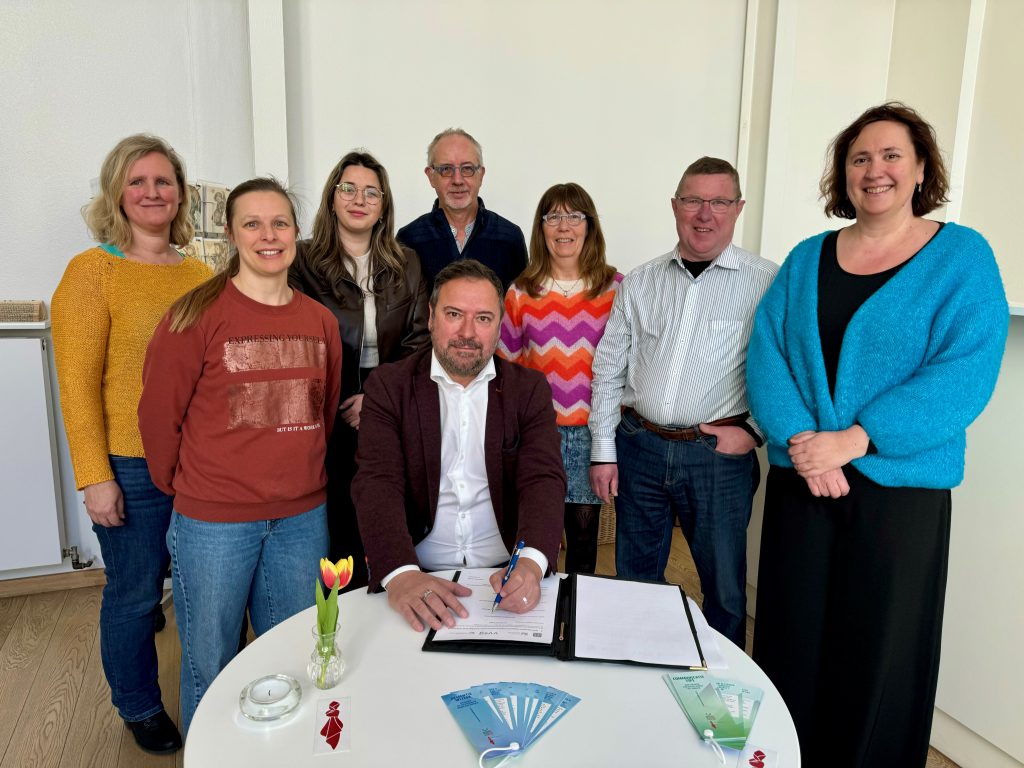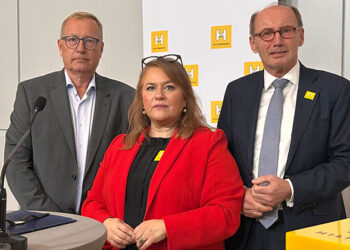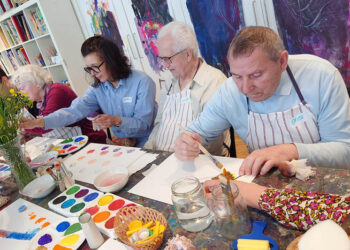In times of demographic change, cities are faced with the major challenge of adapting to the needs of older people and people suffering from dementia. With its “Dementievriendelijk Brugge” project, the city of Bruges in north-west Belgium (West Flanders) shows what a liveable, inclusive city can look like.
Bruges is also facing the challenges of an ageing population. The city has therefore opted for an active health and social policy. Project manager Quintina Jonckheere is one of the driving forces behind the concept of the “dementia-friendly city” – and emphasizes: “You don’t have to be perfectly prepared – you just have to get started”.
What does “dementia-friendly city” mean?
Bruges takes a holistic approach to dementia. It is not just about care and medical treatment. The topic is taken out of the taboo zone and people with dementia are actively included in the city and in social life. The focus is on the quality of life and the possibilities of those affected – not just their diagnosis and their deficits: “We create visibility without stigmatizing.”

This attitude is reflected in the basic principles formulated by the project team (see info box below). They range from respectful communication to social participation and support for family caregivers. Ultimately, the aim is to create an urban climate in which people with dementia are visible, welcome and included.
Two examples illustrate the approach: Information should be formulated clearly and respectfully, and conversations should always address people personally. Restaurant staff, for example, are trained in how they can better support people with dementia. For example, by using clear language, allowing enough time to pay or repeating information. “Even small things make a big difference for those affected,” says Jonckheere. Museums also offer guided tours for people with dementia. Specially trained museum guides enable people with dementia to take a quiet and undisturbed tour of selected works of art.
Together instead of alone
At the heart of the project is the learning network, in which numerous local organizations regularly exchange ideas: care homes, social services, educational institutions and volunteers work together on ideas on how Bruges can become more dementia-friendly. There are also areas that at first glance have nothing to do with care: For example, the sports administration, cultural facilities, the building authority, citizen services. Everywhere, people with dementia encounter employees who need to be trained and sensitized.
“Even in areas where you wouldn’t expect it, the topic needs to be present,” emphasises Jonckheere. Only through continuous educational work dementia can be anchored in urban society as a joint task: “Cooperation is crucial. No one can tackle the issue alone – we need the whole city.” The large number of organisations involved shows the extent to which an ageing society influences urban life and affects all areas of life.
Family carers are also part of the network. Their role is essential, emphasises Jonckheere: “In the future, society will be even more dependent on the care of relatives. That’s why we need to do everything we can to support these people.” Many family members who are carers are already under a lot of pressure: Work, children, household – and then caring for someone with dementia on top of that. “It is massively underestimated how stressful this can be,” says Jonckheere.
In order to master the challenges of an ageing society, ideas are discussed together, results are analyzed and lessons are learned from experience. This is not about a fixed package of measures, but about an ongoing dialog: “Our work is never finished,” says Jonckheere. Rather, it is an ongoing process in which political signals are sent, experiences are exchanged and concrete suggestions for improvement are jointly developed.
Quintina Jonckheere explains another advantage of working together: “Although there are many good solutions for people with dementia, they are often not known – neither by those affected nor by the organizations themselves. Cooperation is therefore essential: “When we work together, everyone benefits. The organizations, but above all the people with dementia, who don’t have to be sent from one place to the next.”
Anyone applying to the city for funding for a dementia-friendly project must also cooperate with other local stakeholders – this is a clear prerequisite. Because only together can synergetic solutions be developed that go beyond the individual approach and make the city as a whole more dementia-friendly.

New approaches to care and support
Quintina Jonckheere emphasizes that the ageing population and associated chronic diseases such as dementia will be a permanent challenge for society. A fundamental shift in thinking in the healthcare sector is therefore becoming increasingly important: away from a purely medical approach (“cure”) towards a caring, person-centered approach (“care”).
This new approach – also known as “cure to care” – is being pursued by more and more organizations and educational institutions, such as the “HoWest” University of Applied Sciences in Bruges. They have even developed their own training package entitled “Van Cure naar Care” – i.e. “From Cure to Care”. Their aim: to increase the palliative care skills of healthcare providers and improve the integration of possible care planning, palliative care and end-of-life care in Flemish healthcare organizations.
At the same time, care is increasingly becoming a task for society as a whole: neighborhoods, volunteers and associations are playing an ever more important role. Good care must not rest solely on the shoulders of individuals: “We need ‘caring neighborhoods’.”
In Bruges, this concept is promoted through specific projects that strengthen neighborhood support and facilitate mutual assistance in everyday life. The data shows that people of low socio-economic status in particular are often more dependent on their neighborhood than on family or friends. “If we want to protect the most vulnerable people in our city, we need to strengthen their neighborhoods,” explains Jonckheere. Such neighborhood structures not only make the city more dementia-friendly, but also promote social participation.
Looking ahead: What the future holds
What does Quintina Jonckheere want for the future? To develop the city into a healthy city with citizens who have a high level of health literacy. This means that people are able to understand and critically categorise health information and apply it to their own life situation. Surveys currently show that the health literacy of many citizens in Belgium is still too low: “Almost two third of Belgians have insufficient health skills.” A field of action to which Jonckheere will pay particular attention.
What advice does Jonckheere have for other cities? “Don’t wait. Just get started. Even small steps can have a big impact.” She emphasizes that building a dementia-friendly or caring community does not depend on perfect conditions or big budgets. The first step is to start conversations, involve local experts, listen and connect existing resources. In this way, solutions that often already exist locally can become visible and effective.
Further information about the project:
🔗 www.brugge.be/dementievriendelijk
What makes Bruges dementia-friendly?
The city is focussing on a holistic approach that goes beyond care and medicine:
- Taboo-breaking measures raise public awareness of dementia. Challenges can only be overcome if we talk about them.
- The focus is on the strengths and possibilities of those affected – without denying their limitations. Quality of life even with a dementia diagnosis.
- People with dementia are given a voice and are actively involved in projects.
- Dementia-friendly communication is key – simple, respectful and inclusive.
- Cooperation between a wide range of organizations creates a network of shared responsibility.
- Family Carers are involved and valued.
- Neighborhoods are strengthened in order to help together.
- Awareness-raising campaigns are used to promote understanding in society.
Author: Anja Herberth
Chefredakteurin















